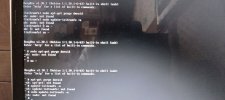Task: To change the OS from Windows to Linux based; Debian OS
System model: Compaq Presario CQ40-317TU Notebook PC.
Processor: Intel Pentium Dual CPU T3400 @ 2.16 GHz.
RAM: 2Gb 2012MB
System: 32 bit operating system
BIOS version: Hewlett-Packard F.24 11/24/2008
OS: Windows Vista Home Basic originally installed on 7/2/2009
Checked: Identified Minimum System Requirements for Debian 12 (Bookworm)
Steps taken:
Failed to load Idlinux.c32
Boot failed: please change disks and press a key to continue."
Requesting advice/s to proceed.
System model: Compaq Presario CQ40-317TU Notebook PC.
Processor: Intel Pentium Dual CPU T3400 @ 2.16 GHz.
RAM: 2Gb 2012MB
System: 32 bit operating system
BIOS version: Hewlett-Packard F.24 11/24/2008
OS: Windows Vista Home Basic originally installed on 7/2/2009
Checked: Identified Minimum System Requirements for Debian 12 (Bookworm)
- 2 GB RAM or more
- Dual Core Processor or higher
- 20 GB Disk Space or more
- Bootable Media (USB or DVD)
- Internet Connectivity (Optional)
Steps taken:
- System Data backup
- Created a bootable USB using Rufus with debian-12.1.0-i386-netinst.iso
- Changed Boot sequence
- Boot stops with the following message:
Failed to load Idlinux.c32
Boot failed: please change disks and press a key to continue."
Requesting advice/s to proceed.
Last edited:


